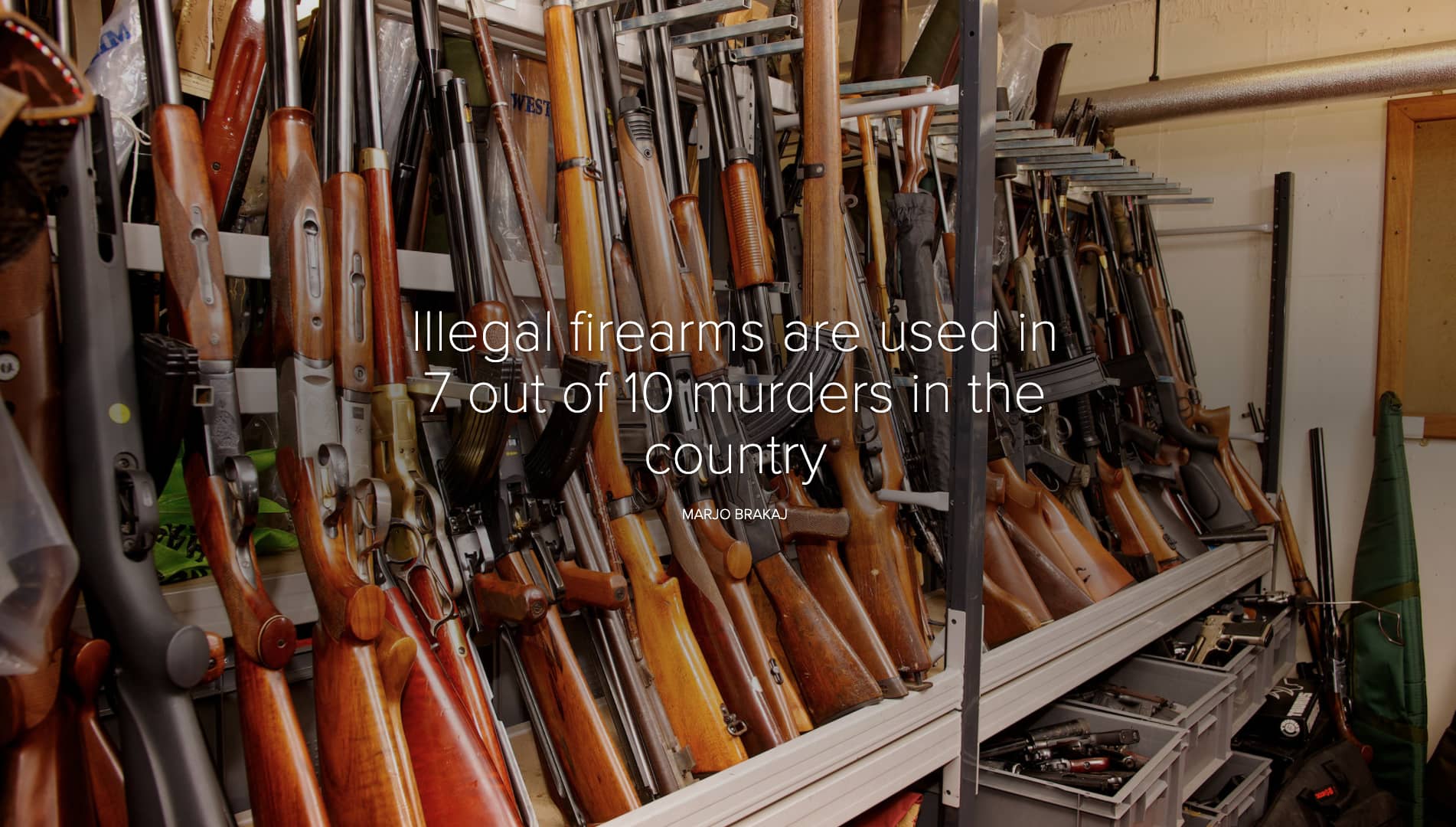To read this article in Albanian click here
Data shows that illegal weapons are used in 7 out of 10 murders in the country, classifying Albania as a country with a high risk of use of firearms. The Kalashnikov, AK-47, continues to be the “king of orders”, while criminal groups prefer new and sophisticated weapons with high precision, a trend that has been observed recently.
Author: Marjo Brakaj
E.Llanaj, sentenced to 4 years in prison for weapons trafficking, has already regretted his “profession”. The 28-year-old from Vlora says that “he started his illicit dealinngs all of a sudden, and in the same way he found himself behind bars”.
“They were used for everything: murder, wounding and robbery with use of violence,” Llanaj told Investigative Network Albania. “I usually took orders inside Vlora.”
In a story for INA MEDIA, the young man says that the “king” of the orders for illegal weapons continues to be the Kalashnikov, AK-47, Russian production, which has been used before by the army, but pistols do not fall behind. According to his story, in Albania it is not at all difficult to find a weapon.
“Acquaintance after acquaintance, messages with orders came from other cities, but I did not receive any money. The Kalashnikovs were from 30 to 70 thousand ALL. The pistols, TT or when we had the chance to find any Glock model 17 or 19, went even further. Even when I was arrested by civilians in Kripore, I had with me a white Glock, a brand-new Kalashnikov, bullets and two grenades. The order was for Fier”, – remembers the young man, already remorseful.
According to data from the General Prosecutor’s Office, in the period of 2016-2020, 24 people were prosecuted in the country for trafficking in weapons and ammunition.
Of these, the records of the district courts show that 7 individuals were convicted by a final decision.

Criminal prosecutions (yellow) and convictions (orange) for trafficking of weapons in the period of 2016-2020
Albania is one of the countries with the highest number of illegal firearms in the hands of the population.
According to data from the Ministry of Interior, after the riots in 1997, 16,000,000 explosives were stolen from weapons depots in the country; 839,310,038 pieces of ammunition and 549,775 weapons.
“Illegal weapons are a permanent danger, which can end up in the hands of killers, with or without desire. The fact that someone keeps it without permission also shows that the person himself is someone who does not respect the law. By carrying an illegal weapon, he has already become a problematic individual and a danger to public safety,” said Pellumb Nako, a former director of the Border Police.
In order to hand over illegal weapons, the Albanian government has approved three amnesties for their voluntary collection/disposal. During these “legal pardons”, 224,521 weapons, 118,714,856 pieces of ammunition and 1,541,386 explosives were handed over.
“In our country, amnesties have been applied several times after 1991 for the criminal offense of illegal possession of weapons, but this has not affected the reduction of criminal events with weapons. Also, amnesty is not an intelligent option to keep criminal groups under control, as the latter consider armaments part of their power over the territory and illegal lines in possession,” said criminology professor Ervin Karamuço.
Currently, the number of illegal weapons in circulation is estimated at 325,254, ammunition pieces at 720,595,182 and 14,458,614 explosives.
The Ministry of Interior estimates that the majority of firearm holders in Albania are men (99.9 percent). Men also make up the vast majority of perpetrators of firearms incidents (98 percent) and are predominant among victims (89 percent).
“Mainly in the northern areas, you can find a Kalashnikov in every apartment. This weapon does not differentiate anybody during its use. Domestic crimes, crimes of passion, blood feuds, robberies or assassinations are committed with them”, – says Ergys Muzhaqi, expert on security issues.
On average, one murder or injury occurs every day. In the last 5 years alone, 284 people have been killed and others injured by firearms.

An illegal firearm is used in 7 out of 10 murders
Data also shows that illegal weapons are used in 7 out of 10 murders in the country, classifying Albania as a country with a high risk of use of firearms.
“In the first 6 months of 2021 in Albania, were recorded 34 murders with firearms. Most of them are carried out in residential areas and with long-range weapons (automatic), which poses a serious threat to public order and security. Although Albania has an index of 2.69 murders per 100,000 inhabitants for 2021, ranking it sixth in Europe, the risk of use of firearms remains very high”, – argues Karamuço.
Illegal firearms are also used in robberies. In the last 5 years, 77 people have been prosecuted for armed robbery.

“In addition to the usual weapons, in recent years there is a trend of using convertible weapons, which can be used in robberies. They can be modified into firearms, which can fire real ammunition, replacing or modifying parts of the weapon. Some organized crime groups are involved in the illegal modification of convertible weapons, which can be cheap to obtain and lucrative to resell as firearms, while being difficult to track by law enforcement agencies “, – says Arjan Dyrmishi from the Center for the Study of Democracy and Governance.
For the State Police, trafficking and firearms incidents remain a very worrying phenomenon, which, despite legal interventions, has not yet found a solution.
“Firearms trafficking, incidents and criminal acts committed with firearms in Albania, still remain a worrying phenomenon, which can be addressed only in a comprehensive and cross-sectoral manner, which will involve a wide range of state and non-state actors”, – explains the State Police in an official response for Investigative Network Albania.
Fatjon Softa, a public safety expert, raises the concern that, even a quarter of a century after the population became armed, they continue to be in the hands of the majority, turning arms smuggling into a kind of “ordinary” business.
“Domestic trafficking consists mainly of weapons left over from 1997. Although it has been going on for almost a quarter of a century, they continue to be functional and traded as commodities. The northern areas also have the largest reserves. It has become a kind of business. The courier transports the weapon with private and public vehicles and even with animals”, – Softa explains how the traffic schemes work.
This phenomenon is also confirmed by the European Commission in this year’s Progress Report for Albania, which states: “In connection with the illegal trafficking of firearms, a large number of firearms circulate in Albania.”
For security expert Ergys Muzhaqi, national security has already been compromised, and work must be done to prevent it from becoming a serious threat. The hotspots are located in the north of the country. The Kalashnikov remains the “favourite” weapon, which in certain areas is found in a large number of families.
“National security is already compromised, due to the number of illegal weapons circulating in the country. What needs to be done is not to turn this situation into a serious threat. The Kalashnikov is a weapon that many state structures have to work on to get. Many families, mainly in the north of the country, possess such a weapon.”
In the Progress Report, the European Commission estimates that in Albania, not only a large number of firearms are circulating, but it raises the alarm that the country has already become a transit country for their trafficking.
“Firearms are used by Albanian criminal groups and are trafficked mainly to neighbouring countries. Albania is a destination and a transit country for firearms. Albania needs to adopt standard procedures and mechanisms to combat the illicit trade in small arms and light weapons. The framework of criminal law remains to be fully aligned with the requirements of the UN Firearms Protocol,” the EC report says.
According to the former head of the Border Police, Nako, through the border crossings enter mainly sophisticated weapons, which have as “clients” criminal groups.
“Sophisticated weapons are certainly entering our country and it is known that they are used by criminal groups, which compete with each other, as well as professional killers, which are being used more and more; including the assassinations with remote-controlled explosives that are circulating in the criminal world,” Nako said.
- Korçari, another young man who for years has been in the arms trafficking business, confirms that new and sophisticated weapons are smuggled into our country, with very high precision rates. While caring to point out that he has finally given up this job, he recounts something from his experience with firearms trafficking from abroad mainly.
“Montenegro, Serbia, Kosovo and Greece to my knowledge have been the main countries from where weapons came to Albania, mainly new and sophisticated weapons. I have introduced the Dragunov SVD, the sniper rifle, the Barrett M82A1, and many other, sophisticated and high-precision weapons. Otherwise known as ‘single-shot’ weapons, which means: certain death,” says the 32-year-old from Fier.
Korçari further explains to Investigative Network Albania that the trafficking network consists mainly of Albanians, Serbs and Italians.
“I had contact points with Albanians. They had deep ties that went beyond the Balkans. The weapons were brought to the Serbian and Italian borders, while I and one or two escorts brought them to Albania. The cracks in the border for their trafficking are found, both on land and at the sea border,” he said, while answering the question of how they managed to penetrate inside the border.
For the Ministry of Interior, the “fight” against trafficking of illegal weapons must be started by the personnel working at the border crossing points.
“Reducing the risks for possession of weapons, explosives and their trafficking should be a priority, both for border control structures and those involved in the fight against organized crime,” the Interior Ministry told INA MEDIA. in an official response.
“Due to the growing trade and movement of people in recent decades, it has become easier and more possible to move illegal goods of all kinds, including weapons. Automatic weapons, extracted from warehouses in 1997, have spread to neighbouring countries, but also to wider Europe. Apart from this direction, small arms of various products have been illegally imported to Albania”, – argues Arjan Dyrmishi.
According to the European Commission, a sophisticated form of arms trafficking is “finding fertile ground” in the country, but also that of 3D “production” of firearms.
“Another threatening phenomenon for the future remains the emergence of new forms of trafficking in firearms parts through postal parcels or express mail, illegal online trading, production of weapons parts in 3D, etc.,” – says in EC Progress Report.
But this phenomenon is neither new nor unknown to the Albanian authorities. According to the former head of the State Police, Fatjon Softa, such printers can be easily found in the city of Durrës.
“Three-dimensional (3D) printing, also known as additive manufacturing (AM), is a technology through which successive layers of material are stacked on top of each other under computer control and the end result is a three-dimensional object. Over the last few years the term 3D printing has also been recognized as a relatively easy method to manufacture firearms, thus raising concerns that this could increase their proliferation, uncertainty and contractor supply. There are such in Durrës “, – Softa explains.
Trafficking in illegal weapons in the country has become a serious concern, because criminal groups can find them easily, with little money and without “leaving a trace”. Furthermore, the introduction of sophisticated methods for their production makes the work of the police to prevent and solve cases even more difficult.




